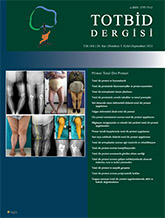
Although quite successful results have been reported in total knee prosthesis performed in patients who do not respond to conservative treatment in advanced stage knee osteoarthritis, the persistence of postoperative pain in 20- 30% of patients causes dissatisfaction in the patients and physicians. In addition, patients are avoiding knee prosthesis surgery due to the negative feedback received from the operated patients in terms of pain. The management of the pain after total knee prosthesis surgery is one of the important factors affecting the success of these surgery. Current literature is focused on the multi-modal pain control to decrease the use of the perioperative opioids. The multi-modal pain control approach involves perioperative combination of nerve blocks and operation site local anaesthetic injections. Successful management of the postoperative pain is directly associated to the early functional healing and the satisfaction of the patient. So, the main goal of the postoperative therapy should be to reduce the pain, to start early rehabilitation and to provide independent ambulation. In order to achieve this goal, each patient should be handled in multidisciplinary approach and provide patient-specific rehabilitation programs with multimodal pain control.